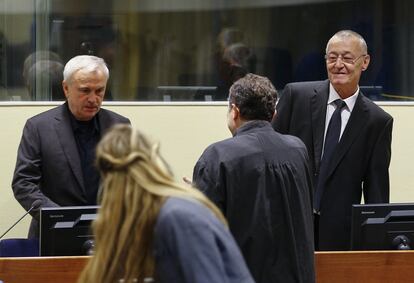Conviction of two Serbian spy chiefs brings major Balkan war trials to a close
After 30 years, the International Criminal Tribunal for the former Yugoslavia concluded its final case and determined that Belgrade was accountable for spearheading a criminal ethnic cleansing enterprise


The major trials of the Balkans war have finally concluded, 30 years after the United Nations established the International Criminal Tribunal for the former Yugoslavia (ICTY) in 1993. The ICTY was formally closed in 2017, but appeals and minor cases dragged on, including an appeal of the case against Jovica Stanisic and Franko Simatovic, Serbian spy chiefs under the country’s former president Slobodan Milosevic. On June 1, the ICTY reached a ground-breaking verdict that Serbian officials were involved in a criminal enterprise at the behest of political and military powers in Belgrade, and acted under their orders in the regions seeking independence during Yugoslavia’s dissolution. The court found in other cases that the defendants were linked to Bosnian Serb or Croatian Serb leaders.
After being found guilty of war crimes and crimes against humanity in Bosnia-Herzegovina and Croatia, the defendants were sentenced to 15 years in prison. The verdict also confirmed that the goal of their crimes was to eliminate non-Serb ethnicities, thus branding it ethnic cleansing.
The Stanisic and Simatovic case highlights the challenges of proving Serbia’s political and military involvement in the atrocities committed in Bosnia and Croatia. Despite organizing and directing the armed units responsible for the murders, deportations, beatings, illegal detentions, sexual abuse, and forced labor, the duo was acquitted in 2013 due to lack of evidence linking them to those crimes. However, in 2015, the appellate court ordered a retrial because of a misinterpretation of the concept of criminal complicity. In 2021, both defendants were sentenced to 12 years in prison. The latest appeal has now led to a 15-year sentence and has exhausted the legal recourse in this case.
Nevenka Tromp, a Croatian investigator for the prosecution during the Milosevic trial, explained the difficulty of establishing the link to Belgrade. Despite life sentences for former Bosnian Serb general Ratko Mladic and his political boss Radovan Karadzic, “not even the convictions for the Srebrenica genocide established that link to Belgrade.” The United Nations International Court of Justice found that “although there was a genocide in Srebrenica, Serbia was not directly responsible or complicit in it, although it erred in failing to prevent it… In other words, absent a conviction of Stanisic and Simatovic, the ICTY would have ended its mandate without implicating the Serbian government. It’s easy to focus on the evil of Mladic, Karadzic, and Milosevic, but it is important to understand the complex machinery of the criminal enterprise for which Stanisic and Simatovic were convicted.”
Serge Brammertz, a war crimes prosecutor in cases pertaining to the former Yugoslavia and Rwanda, said this was “the last chance to convict individuals for participating in a joint criminal enterprise involving Belgrade, whose aim was ethnic cleansing in Bosnia-Herzegovina and Croatia… There was always a political narrative, both from Belgrade and from Zagreb, the Croatian capital, that denied any involvement, alleging that it was an internal armed conflict between Serbs, Croats and Bosniaks in Bosnia-Herzegovina.” From the outset of the Milosevic case, prosecutors identified a direct link between the leadership in Belgrade and the atrocities under investigation, says Brammertz.
Jovica Stanisic, the former head of Serbian state security, was portrayed by the prosecution as one of Milosevic’s most zealous supporters. During the trial, Franko Simatovic (aka Franki) rejected the notion that special forces existed within the state security division. Yet evidence showed a connection between the secret services and paramilitary groups that operated in Croatian and Bosnian territories under Serbian control.
The ICTY’s International Residual Mechanism is responsible for wrapping up minor trials and appeals by supporting local jurisdictions in Bosnia and Croatia. It faces an arduous challenge — there are hundreds of unsolved cases related to the conflict, with alleged criminals still at large. The 10 million documents collected by the ICTY are critical evidence for these courts. However, a disconcerting impunity persists, while the underlying political complexities further muddy the situation. Brammertz acknowledges the magnitude of the task. “It’s tough for them. Hundreds of perpetrators of crimes committed in Bosnia-Herzegovina have found refuge in Croatia or Serbia. Since they hold dual nationality, they cannot legally be extradited to Bosnian territory.”
Before Croatia became a member of the European Union (EU), it showed a commitment to regional cooperation. Bosnia-Herzegovina and Serbia now aspire to join the EU, which Brammertz says has driven more enthusiasm for bringing war criminals to justice. But he is alarmed by the ongoing glorification of war criminals in these communities despite the many years that have elapsed since the conflict. “Denial of the Srebrenica genocide [perpetrated by Bosnian Serb forces in 1995] still has a firm grip on some parts of the former Yugoslavia,” said Brammertz.
Tromp acknowledges the ICTY has provided some level of justice, “but if you look at who started the war, I don’t think the sentences handed down fully reflect that.” She believes that although “Serbia lost the wars it started, it has not been treated as a loser. Public opinion seems to think that the court only focused on Serbs.” To illustrate the problem of reconciliation, she points to how Kosovo and Bosnia are still struggling from territorial divisions. “Look at Northern Kosovo [an area inhabited mostly by ethnic Albanian Serbs seeking autonomy]. And in Bosnia, we have the Republika Srpska [with a majority Serb population], one of the country’s two political entities, established by the 1995 Dayton Peace Accords. All the main victims argue that reconciliation is difficult under these conditions.”
In the 30 years since it was established, the ICTY tried 161 defendants, handed down 90 sentences, acquitted 19 people and heard 4,650 witnesses. Brammertz says that although some cases of contempt and witness intimidation have yet to be resolved by the International Residual Mechanism, the ICTY’s message is clear: “International justice takes time, but it will prevail. Look at the arrest of Fulgence Kayishema, one of the most wanted men for the Rwandan genocide.” A fugitive for 22 years, he was arrested on May 24 in South Africa. Kayishema is accused of direct involvement in the massacre at the Nyange church, which was set on fire and demolished, killing 2,000 people inside.
Experts like Tromp believe the ICTY offers a model and legacy for future cases related to the war in Ukraine. ICTY prosecutors always emphasized the link between Balkan war crimes and Serbian territorial aspirations. “There is a clear analogy between what Serbia did in Croatia and Bosnia-Herzegovina, and the invasion of Ukraine by Russian President Vladimir Putin. Instead of saying that he wants to expand Russia’s borders, he alludes to rescuing Ukrainians of Russian origin. This is what Milosevic said about Serbs in the former Yugoslavia.”
Putin illegally annexed Ukraine’s Luhansk and Donetsk regions, says Tromp, which replicates how the Republika Srpska [in Bosnia] and the Republic of Serbian Krajina [in Croatia] were carved out. If the Russian president is eventually tried for invading Ukraine, “the ICTY’s work will show that political leaders can be prosecuted, although these cases shouldn’t take so long,” adds Tromp.
Sign up for our weekly newsletter to get more English-language news coverage from EL PAÍS USA Edition
Tu suscripción se está usando en otro dispositivo
¿Quieres añadir otro usuario a tu suscripción?
Si continúas leyendo en este dispositivo, no se podrá leer en el otro.
FlechaTu suscripción se está usando en otro dispositivo y solo puedes acceder a EL PAÍS desde un dispositivo a la vez.
Si quieres compartir tu cuenta, cambia tu suscripción a la modalidad Premium, así podrás añadir otro usuario. Cada uno accederá con su propia cuenta de email, lo que os permitirá personalizar vuestra experiencia en EL PAÍS.
¿Tienes una suscripción de empresa? Accede aquí para contratar más cuentas.
En el caso de no saber quién está usando tu cuenta, te recomendamos cambiar tu contraseña aquí.
Si decides continuar compartiendo tu cuenta, este mensaje se mostrará en tu dispositivo y en el de la otra persona que está usando tu cuenta de forma indefinida, afectando a tu experiencia de lectura. Puedes consultar aquí los términos y condiciones de la suscripción digital.








































